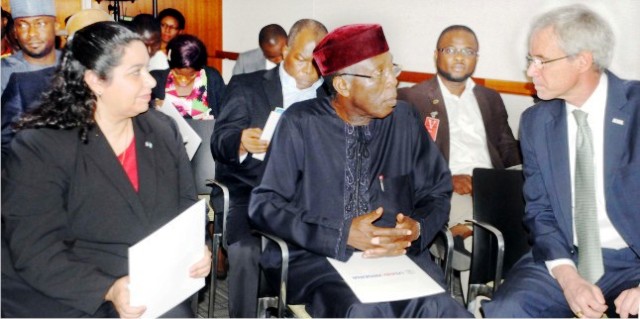Agriculture
‘Nigeria Must Move Forward In Export Biz’

The Customs Area Control
ler, Kirikiri Lighter Terminal Command, Comptroller Benjamin Aber, has urged Nigerians to be more serious with exportation of goods to replenish the country’s dwindling foreign reserves.
The comptroller made the plea at a meeting on the Nigerian Export Trade Hub (NETH), hosted by the Customs command.
He suggested that Nigeria needed to be focused on exportation in order to get out of the current economic recession
Aber had in the last eight months been organizing several meetings geared toward reviving the Kirikiri Terminal.
He said that agriculture could sustain Nigeria if vigorously pursued.
“It is time Nigeria moves forward in its export business. We need to move Nigeria forward away from reliance on oil.
“Agriculture can sustain this country.
“The Nigeria Customs Service is now in the forefront that export business should be done in such a way that it earns foreign exchange for the country,” the comptroller was quoted as saying.
Comptroller Aber said that all federal regulatory agencies would be linked to the NETH, adding that doing business through the Hub would be easy.
NETH was launched on August 2016 by critical stakeholders, including the Central Bank of Nigeria (CBN); Standards Organisation of Nigeria (SON), Nigerian Export Promotion Council (NEPC), National Foods, Drugs Administration and Control (NAFDAC); and Nigerian Association of Chambers of Commerce Industry, Mines and Agriculture (NACCIMA)
It is aimed not only to earn foreign exchange for the country but to also create a trade balance.
The exportable commodities are to be warehoused in Aulic Container Bonded Terminal in the Trade Fair Complex, Lagos.
According to the Coordinator of the Hub, Assistant Superintendent of Customs, Frank Ezeh, NETH gives investors the opportunity to bring in their goods, have easy access to exporting them out of the country.
“This is to also guide against the ban or black listing of Nigerian exports to Europe and the world over.
“With this, the country’s balance of trade will be improved upon,” Ezeh said.
The Chief Executive Officer of Aulic Container Bonded Terminal, Prof. Nick Ezeh, who doubles as the Chairman of the Infrastructure and Business Committee of NETH, said that the terminal has a standard police station.
According to him, there is also an export hall measuring 11,000 square metres, fire service station and a medical clinic.
Ezeh said that with the10-lane road project of the Economic Community of West African States (ECOWAS) and Nigeria, “the terminal is a place to be”.
Corroborating Comptroller Aber’s position on government agencies in the terminal, Ezeh said there were buildings that would accommodate all government agencies in separate offices.
He called on government’s representatives at the meeting to turn in their requirements and how they want their offices to look like.
A representative of NACCIMA, Chief Wale Adegboye said that the Hub would add more value to the exportation of goods in Nigeria and “will bring back the confidence of exporters in Nigeria”.
He lauded the resilience of Comptroller Aber in bringing the needed change with his expertise.
Adegboye promised that the Chamber would support the Hub.
An official of the NEPC, Mrs Mary Ikejiofor, also said that the NEC would support the Hub.
She said, “NETH is a one-stop window that will aid exporters in the exportation of their goods.”
Ikejiafor advised all government agencies to link up to the Hub as it would guide against exportation of bad products.
Already, there will be a data base and documentation management system in the Hub that will aid exportation of goods within 24 hours after a logging in and payment is made to the necessary agency.
Also a warehouse warrant is to be issued by the Nigerian Stock Exchange, (NSE), as the data in the Hub is accessible all round the clock and seamlessly linked to the NEPC.
The data could not be destroyed by fire.
The portal also spotted bad products which will not be allowed to go out as such products would not be certified.
“The Hub also helps the exporter identify potential market and distribution channels of his products and provides fast access to financing.
Agriculture
FG, Ogun Distribute Inputs To 2,400 Farmers
Federal Government and the Ogun State Government, on Wednesday, distributed farm inputs to farmers as part of effort to address food security challenge.
The State Director, Federal Ministry of Agriculture and Food Security, Dr. Toyin Ayo-Ajayi, during the flag-off ceremony of Inputs Redemption Under The National Agricultural Growth Scheme-Agro Pocket (NAGS-AP), in Ogun State, disclosed that beneficiaries of the gesture were primarily rice, maize and cassava farmers across the State.
Ayo-Ajayi commended the Ogun State Government for partnering with the government at the centre for the effort in supporting farmers with inputs that would bring about yieldings for local consumption and likely exportation.
She noted that government is supporting rice, cassava and maize farmers with inputs worth N212,000; N189,000 and N186,000 respectively.
The Permanent Secretary in the State Ministry of Agriculture, Mrs Kehinde Jokotoye, who represented the Commissioner in the Ministry, Bolu Owotomo, stated that traditional farmers are critical in food production, hence the need to encourage and support them with inputs that would bring about desired results during harvesting.
Owotomo said: “Let us make good use of this opportunity, so that the success of this phase will make farmers benefit more from the state and federal governments of Nigeria.”
Earlier, State Coordinator, Federal Ministry of Agriculture and Food Security, Dr. Oluwatoyin Ayo-Ajayi, appreciated the present administration for partnering with the federal government for the initiative, adding that the programme is designed to support farmers at the grassroots level in cassava, rice and maize with inputs such as, seeds, pesticides, herbicides and fertilizers, to boost their production and enhance their livelihood.
Agriculture
Niger Allocates 10,000 Hectares For Smallholder Farmers
The Niger State Government has mapped out 10,000 hectares of farmland in Gbapo Community of Katcha Local Government Area of the State for smallholder farmers to benefit from the state government’s agricultural intervention programme.
Two thousand out of the 10,000 holders of the farmlands have already received inputs.
At a flag-off ceremony in Yinti Village, the facilitator of the programme, Shinkafan Nupe, Malam Idris Usman Makanta, assured the farmers of increased distributions to the mapped-out ten thousand (10,000) farmlands if farmers respond positively.
He explained that the commencement of the two thousand is to measure the positive response of farmers before obtaining full-scale support.
Malam Makanta stated that this initiative aligns with the farmers’ initial commitment through Niger Foods, whose mission is primarily geared towards establishing efficient and profitable agricultural businesses to support the present administration of Governor Mohammed Umaru Bago’s quest to boost agricultural productivity in the state.
He also commended Niger Foods for their steadfastness and resilience in the effective implementation of the input financing scheme.
Makanta reiterated the commitment of the State Governor in making judicious use of the arable land in the state.
Shinkafan Nupe, therefore, urged the farmers to support the Governor by using the inputs wisely so that the dream can be actualised.
Agriculture
GO-CARES: Gombe Empowers 573,429 Farmers, Entrepreneurs
The Gombe State Government has empowered a total of 573,429 farmers and entrepreneurs under the 4th phase of the GO-CARES programme.
The programme was officially flagged off by Governor Inuwa Yahaya in another major step towards alleviating poverty and supporting the state’s vulnerable populations.
The Governor, while inaugurating the disbursement in Akko Community of Akko Local Government Area, restated his administration’s commitment to the welfare of vulnerable citizens in the state.
He was represented by the Commissioner for Budget and Economic Planning, Salihu Baba Alkali, who is also the Chairman of the Steering Committee on GO- CARES implementation.
“The 4th phase of GO-CARES will directly and indirectly impact a total of 573,429 citizens across the state. Of these, 152,429 individuals will benefit directly through cash transfers, livelihood grants, agricultural inputs, and operational grants to small businesses”, he stated.
The Governor added that, “421,000 people will be indirect beneficiaries through infrastructural projects such as classroom blocks, healthcare facilities, WASH services, and rural infrastructure projects like culverts and drainages”.
Yahaya, reaffirmed his commitment to ensuring that the state’s most vulnerable citizens are not left behind in the state’s development.
According to him, “Earlier this year, on June 25, 2024, we flagged off the distribution of improved seedlings, fertilizers, and herbicides to less privileged farmers in Malam Sidi, Kwami Local Government Area, signaling the commencement of the 4th phase implementation of GO-CARES under Result Area 2”.
The Governor reiterated that these initiatives have had a significant impact on the livelihoods of beneficiaries and the overall agricultural sector.
He explained that, “Today’s ceremony marked the simultaneous launch of activities under all three GO-CARES Result Areas for the 4th phase. These areas include: State Cash Transfer Grants: 2,500 direct beneficiaries; Labour Intensive Public Works: 2,700 direct beneficiaries; Livelihood Grants: 10,000 direct beneficiaries; and Basic Services: 405,000 indirect beneficiaries”.
-

 Oil & Energy3 days ago
Oil & Energy3 days agoOPEC+Commits To Monitoring Oil Production Adjustment
-

 Business3 days ago
Business3 days agoNigeria, Still Africa’s Largest Economy – World Bank
-

 News3 days ago
News3 days agoSoludo Rebagged FG Rice Shared To APGA Members-APC
-

 Sports3 days ago
Sports3 days agoTennis: Alcaraz Celebrates First Indoor Title
-

 News3 days ago
News3 days agoN’Central APC Threatens To Sanction Members Attacking Tinubu
-

 Opinion3 days ago
Opinion3 days ago2050: Expectations For Poultry Enterprise
-

 Maritime3 days ago
Maritime3 days agoLASWA Deploys Data Management Tech In Water Transport
-

 Oil & Energy3 days ago
Oil & Energy3 days agoDrought Dims Hydropower’s Promise

